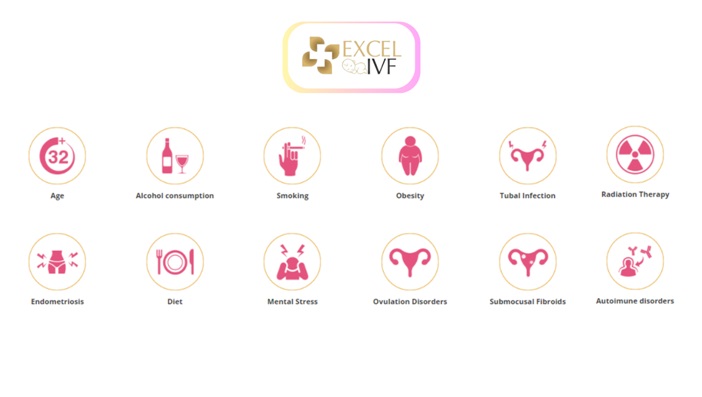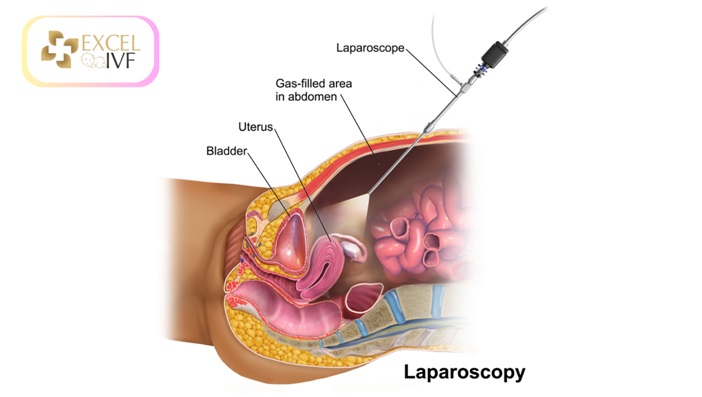If you and your partner are among those couples who struggle to conceive, you know that dealing with fertility issues can be very hard. But before you start losing hope, you must explore the infertility treatment options.

Yes, you heard right.
There are several treatment options available that can give you a helping hand on your baby-making journey. In this blog, we will discuss the common options to treat infertility in women. Keep reading!
What is Female Infertility?
First of all, learn about female infertility to get a better understanding of infertility treatments.
In simple words, infertility is the inability to get pregnant after trying for a year (or six months if you’re over 35). It’s a common problem, affecting one in eight couples.
The most common signs of infertility may include:
- Not getting pregnant after a year of trying
- Irregular periods or missed periods
- Heavy bleeding
Causes of Female Infertility?
There is no single answer to the question, as a variety of factors can cause infertility. However, some of the common causes of infertility may include:

Age: The age of a woman is one of the major factors that contribute to infertility in women because as you age, your egg quality and quantity reduce, making it difficult to get pregnant.
Ovulation Issues: Sometimes, problems with ovulation or the release of an egg from the ovary can impact your ability to conceive a baby. It can occur due to conditions like polycystic ovary syndrome (PCOS), which can affect hormone levels and interfere with ovulation.
Fallopian Tube Blockage: Fallopian tubes are the tunnels that carry the egg from the ovary to the uterus. Blockage in the fallopian tubes due to scarring from previous infections or endometriosis, a condition where tissue similar to the uterine lining grows outside the uterus, can lead to infertility.
Uterine Disorders: The uterus itself can also be a source of infertility in women. Conditions like uterine fibroids, polyps, or an abnormal shape of the uterus can make it difficult for an egg to implant and grow.
Lifestyle Factors: Lifestyle factors like smoking, taking caffeine and alcohol, and stress are not the direct causes of infertility; they can contribute to the problem by affecting hormone levels and overall health.
Understanding these factors can help the fertility specialist find the appropriate treatment options.
Diagnosis
If you have been trying to get pregnant for a while without success, it’s time to consult the fertility specialist at the IVF centre in Delhi. Your doctor will evaluate both you and your partner to see if any underlying medical conditions could be affecting your fertility. They will also take a detailed medical history and do fertility tests.
These fertility tests may include the following:
- Ovulation testing
- Hysterosalpingography
- Ovarian reserve testing
- Pelvic ultrasound
- Laparoscopy
Female Fertility Treatment
Once your doctor has identified the cause of infertility, he/she will start designing the treatment plan.
Usually, the treatment options are classified into two types:
- Ovulation Induction
- Assisted Reproductive Treatments (IVF and IUI treatment)
Apart from these, some are facilitating surgical techniques that help to eliminate the causes that may be contributing to infertility. Treating these causes or underlying conditions can lead to ease of treatments and better outcomes.
Let’s explore these methods in detail.
Ovulation Induction

If your periods are irregular or don’t happen at all, it means you are not ovulating regularly. Several medications can help you induce ovulation.
These medications may include:
Clomiphene Citrate: Clomiphene Citrate is an oral medication that works by stimulating the production of follicle-stimulating hormone (FSH) and luteinizing hormone (LH), which are essential for the ovarian follicle growth.
Gonadotropins: Injectable gonadotropins are another type of treatment for infertility in women that can help your ovaries produce more eggs. They come in various forms, including hMG (Menopur) and FSH (Gonal-F, Follistim AQ, Bravelle).
Metformin: When insulin resistance is confirmed or suspected cause of infertility in women, usually when you are diagnosed with PCOS, your doctor may prescribe this medication to you. Metformin can help to improve insulin resistance, resulting in improved ovulation.
While these medications can effectively treat infertility by inducing ovulation, they carry some side effects as well, including:
- Injectable medicines can increase the risk of multiple pregnancies.
- Ovarian hyperstimulation syndrome (OHSS)
Assisted Reproductive Treatments (ART)
When the ovulation induction method does not work, then your doctor may recommend you opt for assisted reproductive treatment to get pregnant. These treatments may include:

Intrauterine Insemination (IUI): IUI treatment is one of the simple ART treatments for couples dealing with infertility. During this procedure, semen sample from the husband is obtained and washed t0o concentrate only the motile sperms and it is then directly placed in the uterus for fertilization at the time of ovulation. IUI treatment improves the chances of fertilization because the time length of sperm travel is reduced. In this method, ovulation is induced with fertility medications.
The success rate of IUI treatment is usually lower (18-20%) than IVF.
In Vitro Fertilization (IVF): If you have tried IUI for infertility in women treatment but failed, then your doctor will prescribe the most effective solution called IVF. In this procedure, your doctor will start giving you a hormonal injection to stimulate your ovaries to produce more eggs. Once the optimal number of eggs is achieved, your doctor will retrieve the eggs under anesthesia. On the same day, your partner will be asked to give the semen sample. This semen sample is prepared, and healthy sperm are collected. These sperm are fused with eggs in the laboratory under controlled conditions. After that, one or two good embryos are selected and carefully placed in the uterus with a thin catheter.
The success rate of IVF is usually higher than other fertility methods. It is up to 60-70%. Although IVF is one of the safest methods, it carries some side effects as well:
- Chances of redness, itching and pain at the injection site
- Water retention, constipation, and nausea are manageable.
- Allergic reaction to anesthesia
- Multiple pregnancies
- Ectopic pregnancy
However, choosing the best IVF centre in Delhi can help you eliminate all these risks and achieve a healthy pregnancy through IVF without any complications.
Intracytoplasmic Sperm Injection (ICSI): ICSI is a type of in vitro fertilization (IVF), but it’s different from traditional IVF in one key way: with ICSI, a single sperm is injected directly into an egg. This can improve the chance of conception, especially for couples suffering from male-factor infertility.
ICSI can be used to treat female infertility if:
- You have endometriosis, which can cause inflammation and scarring in the pelvis, making it difficult for the sperm to reach the egg and fertilize it.
- You have a low egg reserve, so you don’t have enough eggs left. ICSI can help to increase the chances of fertilization by injecting a single sperm directly into each egg.
- You are dealing with unexplained infertility, which means that your doctor can’t find any specific reason why you are not getting pregnant. ICSI can be used to fertilize the egg and create an embryo.
ICSI is a very effective treatment for Infertility in women and helps many couples conceive and have children. There are still other factors that can affect your chances of getting pregnant, such as your age and the quality of the eggs. These may require other treatment considerations.
Surgical Options
Surgical procedures like hysteroscopy and laparoscopy play a pivotal role in enhancing the effectiveness of infertility treatments. These minimally invasive surgeries allow for a detailed examination and treatment of underlying conditions that often contribute to infertility.
Think of hysteroscopy and laparoscopy as helping hands in the world of infertility treatments. Hysteroscopy is like a special camera going inside the uterus. It lets doctors see if there’s anything like small growths or scar tissue that could make it hard for a baby to grow there. If they find anything, they can often fix it right then and there.
Laparoscopy is a bit different. It’s more about checking out the area around the uterus, like the ovaries and fallopian tubes. It’s great for spotting and fixing things like cysts, fibroids, endometriosis or blocked tubes, which are big hurdles for getting pregnant.
Let’s see how they are performed and how they work.

Laparoscopy: Laparoscopy is a minimally invasive procedure requiring only a small incision in the abdomen. Then, your doctor will insert a laparoscope, a thin, tube-like instrument with a camera at the end, through the incision.
The laparoscope allows the surgeon to see inside the abdomen and pelvis without a large incision. It is often used for:
- Removing adhesions interfering with tubal function
- Removing fibroids
- Opening blocked tubes
- Treating endometriosis
- Removing cysts from your ovaries or uterus
Laparoscopy is a safe and effective procedure, but there are some risks associated with it, such as bleeding, infection, and injury to the organs in the abdomen. However, these risks are rare.
Hysteroscopy: Hysteroscopy allows your doctor to look inside your uterus. During hysteroscopy, a thin, flexible tube with a camera on the end is inserted through the cervix into the uterus. The doctor can then view the inside of the uterus on a monitor. This allows the doctor to look for abnormalities like fibroids, polyps, or scarring.

If your doctor sees any abnormalities, they may take a tissue sample for biopsy. This will help them to diagnose the problem and recommend the best course of treatment, like IVF or IUI treatment.
The Parting Thoughts
Struggling through infertility in women can be tough, but don’t lose hope. Dr. Rhythm Gupta, a compassionate and skilled infertility specialist in Delhi, is here to help. If you find it hard to conceive, schedule a consultation with Dr. Gupta. Together, you can explore various treatment options and craft a personalized plan to enhance your chances of pregnancy. Take that first step towards your dream of parenthood – reach out to Dr. Rhythm Gupta today.

